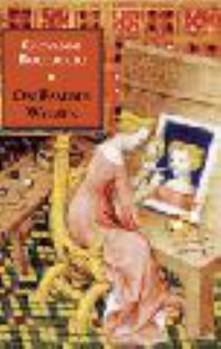Book Overview
Boccaccio's "On Famous Women" ("De claris mulieribus") is a remarkable work that contains the lives of one hundred and six women in myth and history, ranging from Eve to Boccaccio's contemporary, Queen Giovanna I of Naples. It is the first collection of women's biographies ever written. Boccaccio composed it at Certaldo in 1361/62 and revised it in various stages to the end of his life in 1375. He dedicated it to Andrea Acciaiuoli, countess of Altavilla...
Format:Paperback
Language:English
ISBN:1599102668
ISBN13:9781599102665
Release Date:August 2011
Publisher:Italica Press
Length:312 Pages
Weight:0.90 lbs.
Dimensions:0.7" x 5.5" x 8.5"
Customer Reviews
3 ratings
Boccaccio's De mulieribus claris
Published by Thriftbooks.com User , 15 years ago
(some reviewers have noted that their edition did not include the Latin text - the hardcover has both Latin and English and the soft cover contains only the English translation) Giovanni Boccaccio's De mulieribus claris was the first collection of biographies in Western literature "devoted exclusively to women". Boccaccio (1313-1375) dedicated it to Andrea Acciaiuoli, Countess of Atlavilla, a Tuscan noblewoman. This work was inspired by Petrarch's De viris illustribus. Boccaccio sought to record to posterity the stories of women who were virtuous and did good deeds. However, he includes both good and bad models for women. Boccaccio hoped that by including both models, his work will function as a "spur to virtue and a curb on vice." Boccaccio primarily selects pagan women of Greco-Roman antiquity. He excluded Christian women since they were celebrated in hagiographic literature. Secondly, pagan women who where not inspired by Christian virtue achieved "achieved earthly fame with the help of gifts and instincts they had received from Nature," or through the desire for glory. He believed that even these examples should be emulated by Christian women. Some of the most interesting chapters in my opinion pertain to women connected to Nero and his reign. Chapter XCII concerns the life of Agrippina, mother of the monstrous Nero. Chapter XCII, tells the tale of Epicharis, a freedwoman, who joined the conspiracy against Nero and committed suicide rather than give the names of the conspirators. Chapter XCIV, recounts how Pompea Paulina wife of Seneca, Nero's tutor, tried to commit suicide with her husband but was rescued by Nero at the last moment. And lastly, Chapter XCV tells the legend of Sabina Poppea, the scheming wife of Nero, who dies ignominiously after being kicked by her husband while pregnant. Some other interesting women in the text include Lesbia, Minerva, and various Queens (Dido, Jacosta, etc). Boccaccio stresses that women should be learned, loyal, and virtuous. He digresses lengthily on the virtues of Roman conception of marriage and laments how women in his time get married more than once. Likewise, he warns against lust and excessive scheming. Each chapter follows a similar structure. First, he begins with the name of the woman, her parentage, and her rank. Then, an explanation of her fame with allusions to historians and other authorities. Each ends concludes with an often lengthy moralizing precept. This is an absolutely fascinating text. Often Boccaccio's Decameron overshadows his lesser known works. He also wrote a similar history of famous men which sadly does not have an English translation (an Italian edition exists in print). Virginia Brown provides a wonderful introduction, a source list for each chapter, and a truly beautiful translation which is a joy to read. It is fascinating comparing Boccaccio's account of famous women with Christine de Pizan's The Book of the City of Ladies (considered the
Entertaining, middle age reading
Published by Thriftbooks.com User , 18 years ago
This book was awesome and entertaining. It was easy reading. Reading this book I wondered how much was true and how much was based on myth. If these lives were all true, then history should be renamed herstory!
Great fun!
Published by Thriftbooks.com User , 20 years ago
I'm not a classicist, so I'm not really sure why I bought this book, but I am having so much fun with it! It is filled with short biographical blurbs of, you guessed it, famous women. The sexism and religious bigotry is amazingly entertaining, as Boccaccio tries to reconcile ancient goddesses with his Renaissance Christian beliefs. I definately recomend this to anyone interested in women's history (even if they only dabble in it) or anyone interested in religious history.





